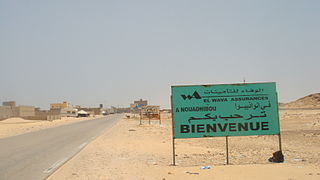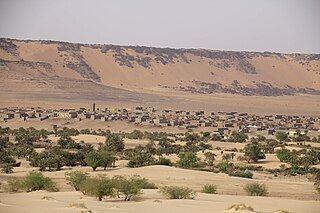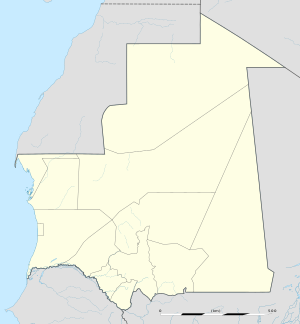The original inhabitants of Mauritania were the Bafour, presumably a Mande ethnic group, connected to the contemporary Arabized minor social group of Imraguen ("fishermen") on the Atlantic coast.

Nouakchott is the capital and largest city of Mauritania. Located in the southwestern part of the country, it is one of the largest cities in the Sahara. The city also serves as the administrative and economic center of Mauritania.

French West Africa was a federation of eight French colonial territories in West Africa: Mauritania, Senegal, French Sudan, French Guinea, Ivory Coast, Upper Volta, Dahomey and Niger. The federation existed from 1895 until 1958. Its capital was Saint-Louis in Senegal until 1902, and then Dakar until the federation's collapse in 1960.

Nouadhibou is the second largest city in Mauritania and serves as a major commercial center. The city has about 173,000 inhabitants. It is situated on a 65-kilometre peninsula or headland called Ras Nouadhibou, Cap Blanc, or Cabo Blanco, of which the western side has the city of La Güera. Nouadhibou is consequently located merely a couple of kilometers from the border between Mauritania and Western Sahara. Its current mayor is Elghassem Ould Bellali, who was installed on 15 October 2018.

Oualata or Walata is a small oasis town in southeast Mauritania, located at the eastern end of the Aoukar basin. Oualata was important as a caravan city in the thirteenth and fourteenth centuries as the southern terminus of a trans-Saharan trade route and now it is a World Heritage Site.

Tichit, or Tichitt, is a village at the foot of the Tagant Plateau in central southern Mauritania that is known for its vernacular architecture and proximity to the Dhar Tichitt archaeological sites. The main agriculture in Tichit is date farming, and the village is also home to a small museum.

Chinguetti is a ksar and a medieval trading center in northern Mauritania, located on the Adrar Plateau east of Atar. Chinguetti had a population of 4,800 as of 2013.

Virtually all Mauritanians are Sunni Muslims. They adhere to the Maliki madhhab, one of the four Sunni schools of law. Since independence in 1960, Mauritania has been an Islamic republic. The Constitutional Charter of 1985 declares Islam the state religion and sharia the law of the land.

The Mauritania–Senegal Border War was a conflict fought between the West African countries of Mauritania and Senegal along their shared border from 1989 to 1991. The conflict began around disputes over the two countries' River Senegal border and grazing rights. The conflict resulted in the rupture of diplomatic relations between the two countries for several years, the creation of thousands of refugees from both sides, as well as having a significant impact on domestic Senegalese politics.

The Haratin, also spelled Haratine or Harratin, are an ethnic group found in western Sahel and southwestern Maghreb. The Haratin are mostly found in modern Mauritania, Morocco, Western Sahara, and Algeria. In Tunisia and Libya, they are referred to as Shwashin.

Kiffa is a large town in the far south region of Mauritania, and the name of an administrative area within the local Assaba Region.

Choum is a town in northern Mauritania, lying in the Adrar Region close to the border with Western Sahara.

Slavery has been called "deeply rooted" in the structure of the northwest African country of Mauritania and estimated to be "closely tied" to the ethnic composition of the country, although it has also been estimated that "Widespread slavery was traditional among ethnic groups of the largely nonpastoralist south, where it had no racial origins or overtones; masters and slaves alike were black", despite the cessation of slavery across other African countries and an official ban on the practice since 1905.

Greater Mauritania is a term for the Mauritanian irredentist claim that generally includes the Western Sahara and other Sahrawi-populated areas of the western Sahara Desert. The term was initially used by Mauritania's first President, Mokhtar Ould Daddah, as he began claiming the territory then known as Spanish Sahara even before Mauritanian independence in 1960.

The continent of Africa is one of the regions most rife with contemporary slavery. Slavery in Africa has a long history, within Africa since before historical records, but intensifying with the trans-Saharan and Indian Ocean slave trade and again with the trans-Atlantic slave trade; the demand for slaves created an entire series of kingdoms which existed in a state of perpetual warfare in order to generate the prisoners of war necessary for the lucrative export of slaves. These patterns persisted into the colonial period during the late 19th and early 20th century. Although the colonial authorities attempted to suppress slavery around 1900, their attempts were largely ineffective. Even after decolonization, slavery continues in many parts of Africa despite being officially illegal.
In December 1984, Haidallah was deposed by Colonel Maaouya Ould Sid'Ahmed Taya, who, while retaining tight military control, relaxed the political climate. Ould Taya moderated Mauritania's previous pro-Algerian stance, and re-established ties with Morocco during the late 1980s. He deepened these ties during the late 1990s and early 2000s as part of Mauritania's drive to attract support from Western states and Western-aligned Arab states. Mauritania has not rescinded its recognition of Polisario's Western Saharan exile government and remains on good terms with Algeria. Its position on the Western Sahara conflict has been, since the 1980s, one of strict neutrality.

Issues impacting Women in Mauritanian society include female genital mutilation, child marriage, and polygamy.

Mauritania, formally the Islamic Republic of Mauritania, is a sovereign country in Northwest Africa. It is bordered by the Atlantic Ocean to the west, Western Sahara to the north and northwest, Algeria to the northeast, Mali to the east and southeast, and Senegal to the southwest. By land area Mauritania is the 11th-largest country in Africa and 28th-largest in the world; 90% of its territory is in the Sahara. Most of its population of some 4.3 million lives in the temperate south of the country, with roughly a third concentrated in the capital and largest city, Nouakchott, on the Atlantic coast.
The following is a timeline of the history of the city of Nouakchott, Mauritania.

Mauritanian nationality law is regulated by the Constitution of Mauritania, as amended; the Mauritanian Nationality Code, and its revisions; and various international agreements to which the country is a signatory. These laws determine who is, or is eligible to be, a national of Mauritania. The legal means to acquire nationality, formal legal membership in a nation, differ from the domestic relationship of rights and obligations between a national and the nation, known as citizenship. Nationality describes the relationship of an individual to the state under international law, whereas citizenship is the domestic relationship of an individual within the nation. Mauritanian nationality is typically obtained under the jus sanguinis, i.e. by birth in Mauritania or abroad to parents with Mauritanian nationality. It can be granted to persons with an affiliation to the country, or to a permanent resident who has lived in the country for a given period of time through naturalization.
















